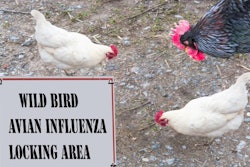
The only countries to have officially reported new outbreaks of highly pathogenic avian influenza (HPAI) in poultry over the last week are Iran and Taiwan, and the virus has also been detected in pet birds in Kuwait.
During the last week, the Iran Veterinary Organization has reported to the World Organisation for Animal Health (OIE) four new HPAI outbreaks linked to the H5N8 virus subtype. Confirmed in the latter half of January, the poultry affected belonged to three flocks described as “backyard” and one “village.” A total of almost 2,400 birds were lost to the disease through mortality or destruction at locations in the north-western provinces of West Azerbayejan, Zanjan, and Gilan.
Together with three previous outbreaks in other provinces during January, the outbreaks are reported to have been “closed successfully,” according to the Iran Veterinary Organization, and the disease situation has been resolved.
Taiwan’s Council of Agriculture has reported to the OIE two new outbreaks of HPAI. The H5N2 virus subtype was detected in a flock of 6,510 meat ducks in Pingtung county, and in the carcasses of 100 native chickens found dumped in Xinfeng town in Hsinchu county. This unwelcome find had already been reported in local media.
In recent days, more than 11,000 chickens have been culled at a farm in Yunlin county after testing positive for an H5 HPAI virus, reports Focus Taiwan. The virus was detected at the same premises in 2018. This latest outbreak brings Taiwan’s total so far this year to three, with 22,375 culled to control the further spread of the disease.
One month ago, the agriculture ministry in South Korea introduced new rules to prevent HPAI returning to the country, reports the Yonhap news agency. Among the latest measures are a prohibition of new farms within 500 meters of a chicken or duck farm, or in an area deemed prone to avian flu outbreaks.
Pet birds culled in Kuwait
All birds at a pet market in Rai have been culled as a result of avian flu, according to Kuwait Times. The State’s last outbreak of HPAI started in February of 2007, and the virus was later confirmed at 20 farms across the country.
The same source reports that the Ministry of Commerce and Industry has recently lifted a ban on imports of poultry meat and egg products from Mexico imposed following previous HPAI outbreaks. A trade ban is now being applied to similar products from India after the disease has been confirmed there.
Africa: Uganda pushes for lifting of poultry trade ban
Uganda is hoping for the imminent lifting of a ban on poultry product exports to its neighbors in East Africa, reports Daily Monitor. One of its most important markets — Kenya — has only allowed in products from three Ugandan firms since 2017, and then only under strict controls.
The Ugandan veterinary authority is reported to have submitted a report to the OIE that it has eradicated HPAI from the country, and poultry producers are pushing for free export trade to resume.
Based on official reports to the OIE, it appears that the H5N8 subtype of the virus was involved in the mass mortality of wild birds at two locations in Uganda in early 2017. No cases in poultry were reported at the time or to date.
Avian influenza A virus detected in one human case in China
One woman in Guangdong province in China tested positive for avian influenza A virus of the H9N2 type in December following a mild illness, according to a new report from the World Health Organization (WHO). The patient did not report exposure to poultry, but this group of viruses is enzootic in poultry in China.
No new human cases of infections with the H5 or H7N9 subgroups were reported to the WHO in the last month.















